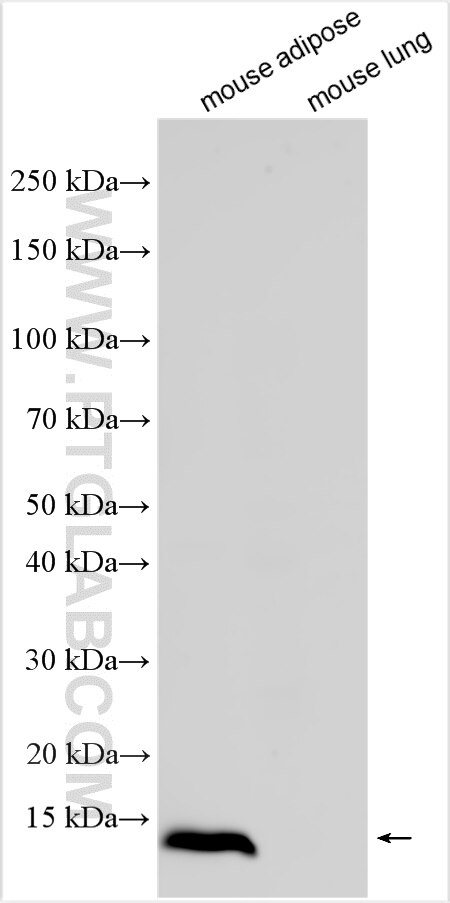Resistin Polyklonaler Antikörper
Resistin Polyklonal Antikörper für WB, ELISA
Wirt / Isotyp
Kaninchen / IgG
Getestete Reaktivität
Maus
Anwendung
WB, ELISA
Konjugation
Unkonjugiert
Kat-Nr. : 32786-1-AP
Synonyme
Geprüfte Anwendungen
| Erfolgreiche Detektion in WB | Maus-Fettgewebe |
Empfohlene Verdünnung
| Anwendung | Verdünnung |
|---|---|
| Western Blot (WB) | WB : 1:1000-1:4000 |
| It is recommended that this reagent should be titrated in each testing system to obtain optimal results. | |
| Sample-dependent, check data in validation data gallery | |
Produktinformation
32786-1-AP bindet in WB, ELISA Resistin und zeigt Reaktivität mit Maus
| Getestete Reaktivität | Maus |
| Wirt / Isotyp | Kaninchen / IgG |
| Klonalität | Polyklonal |
| Typ | Antikörper |
| Immunogen | Resistin fusion protein Eg3391 |
| Vollständiger Name | resistin |
| Berechnetes Molekulargewicht | 12 kDa |
| Beobachtetes Molekulargewicht | 12 kDa |
| GenBank-Zugangsnummer | NM_001204959.1 |
| Gene symbol | Retn |
| Gene ID (NCBI) | 57264 |
| Konjugation | Unkonjugiert |
| Form | Liquid |
| Reinigungsmethode | Antigen-Affinitätsreinigung |
| Lagerungspuffer | PBS with 0.02% sodium azide and 50% glycerol |
| Lagerungsbedingungen | Bei -20°C lagern. Nach dem Versand ein Jahr lang stabil Aliquotieren ist bei -20oC Lagerung nicht notwendig. 20ul Größen enthalten 0,1% BSA. |
Hintergrundinformationen
Resistin, an adipokine produced in fat tissue, is a cysteine rich protein with a molecular weight of 12 kDa. Resistin inhibits insulin action, signaling, and glucose metabolism. Previous data have suggested that resistin secretion is linked to insulin resistance (IR) and type 2 diabetes. Resistin expression in rodents is limited only to adipocytes, but human resistin is produced mainly by macrophages and monocytes, which show only 59% amino acid homology to mice. (PMID: 34325643, PMID: 32991315)
Protokolle
| PRODUKTSPEZIFISCHE PROTOKOLLE | |
|---|---|
| WB protocol for Resistin antibody 32786-1-AP | Protokoll herunterladen |
| STANDARD-PROTOKOLLE | |
|---|---|
| Klicken Sie hier, um unsere Standardprotokolle anzuzeigen |


